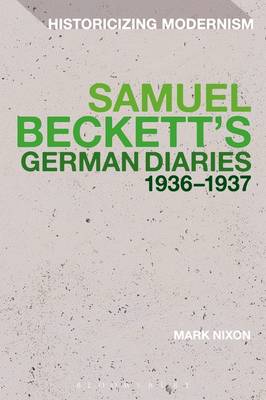Historicizing Modernism
1 total work
This book sheds new light on the development of crucial aspects of Beckett's post-war writing by drawing on exclusive access to his unpublished German diaries. Six diary notebooks kept by Samuel Beckett during his 1936-7 trip through Nazi Germany were discovered in 1989. "Samuel Beckett's German Diaries 1936-1937" is the first study to explore the relevance of these diaries to Beckett's development as a writer. Using the diaries as the central point of focus, Nixon draws on unpublished manuscripts, notebooks, correspondence, reading notes from the 1930s to reflect on both Beckett's creative evolution prior to 1936 and the direction his writing took after his return to Dublin in April 1937. As well as gaining an insight into Beckett's reading of classical German literature, Nixon shows how the pared-down style of writing, the self-examination and the importance of the visual arts that govern Beckett's post-war works traces back to the pages of these notebooks. By illuminating how Beckett's writing and aesthetics underwent a far-reaching change during the 1930s, Nixon's study is crucial to our understanding of the emergence of Beckett as a radical writer in the post-war years.
"Historicizing Modernism" challenges traditional literary interpretations by taking an empirical approach to modernist writing: a direct response to new documentary sources made available over the last decade. Informed by archival research, and working beyond the usual European/American avant-garde 1900-1945 parameters the series reassesses established images of modernist writers by developing fresh views of intellectual backgrounds and working methods.
"Historicizing Modernism" challenges traditional literary interpretations by taking an empirical approach to modernist writing: a direct response to new documentary sources made available over the last decade. Informed by archival research, and working beyond the usual European/American avant-garde 1900-1945 parameters the series reassesses established images of modernist writers by developing fresh views of intellectual backgrounds and working methods.
